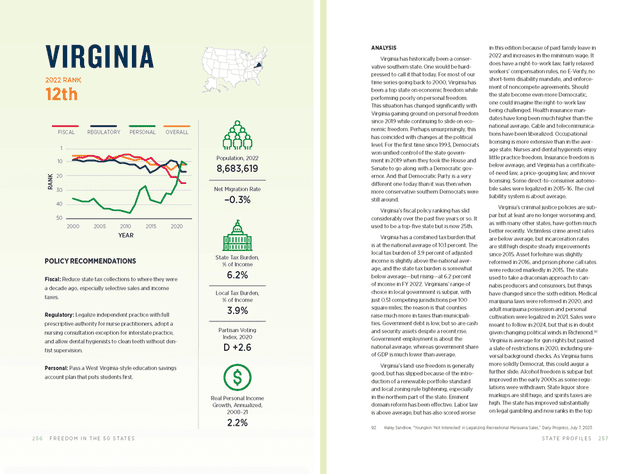Policy Recommendations
- Fiscal Reduce state tax collections to where they were a decade ago, especially selective sales and income taxes.
- Regulatory Legalize independent practice with full prescriptive authority for nurse practitioners, adopt a nursing consultation exception for interstate practice, and allow dental hygienists to clean teeth without dentist supervision.
- Personal Pass a West Virginia-style education savings account plan that puts students first.
Analysis
Virginia has historically been a conservative southern state. One would be hard-pressed to call it that today. For most of our time series going back to 2000, Virginia has been a top state on economic freedom while performing poorly on personal freedom. This situation has changed significantly with Virginia gaining ground on personal freedom since 2019 while continuing to slide on economic freedom. Perhaps unsurprisingly, this has coincided with changes at the political level. For the first time since 1993, Democrats won unified control of the state government in 2019 when they took the House and Senate to go along with a Democratic governor. And that Democratic Party is a very different one today than it was then when more conservative southern Democrats were still around.
Virginia’s fiscal policy ranking has slid considerably over the past five years or so. It used to be a top-five state but is now 25th.
Virginia has a combined tax burden that is at the national average of 10.1 percent. The local tax burden of 3.9 percent of adjusted income is slightly above the national average, and the state tax burden is somewhat below average—but rising—at 6.2 percent of income in FY 2022. Virginians’ range of choice in local government is subpar, with just 0.51 competing jurisdictions per 100 square miles; the reason is that counties raise much more in taxes than municipalities. Government debt is low, but so are cash and security assets despite a recent rise. Government employment is about the national average, whereas government share of GDP is much lower than average.
Virginia’s land-use freedom is generally good, but has slipped because of the introduction of a renewable portfolio standard and local zoning rule tightening, especially in the northern part of the state. Eminent domain reform has been effective. Labor law is above average, but has also scored worse in this edition because of paid family leave in 2022 and increases in the minimum wage. It does have a right-to-work law, fairly relaxed workers’ compensation rules, no E-Verify, no short-term disability mandate, and enforcement of noncompete agreements. Should the state become even more Democratic, one could imagine the right-to-work law being challenged. Health insurance mandates have long been much higher than the national average. Cable and telecommunications have been liberalized. Occupational licensing is more extensive than in the average state. Nurses and dental hygienists enjoy little practice freedom. Insurance freedom is below average, and Virginia has a certificate-of-need law, a price-gouging law, and mover licensing. Some direct-to-consumer automobile sales were legalized in 2015–16. The civil liability system is about average.
Virginia’s criminal justice policies are subpar but at least are no longer worsening and, as with many other states, have gotten much better recently. Victimless crime arrest rates are below average, but incarceration rates are still high despite steady improvements since 2015. Asset forfeiture was slightly reformed in 2016, and prison phone call rates were reduced markedly in 2015. The state used to take a draconian approach to cannabis producers and consumers, but things have changed since the sixth edition. Medical marijuana laws were reformed in 2020, and adult marijuana possession and personal cultivation were legalized in 2021. Sales were meant to follow in 2024, but that is in doubt given changing political winds in Richmond. Virginia is average for gun rights but passed a slate of restrictions in 2020, including universal background checks. As Virginia turns more solidly Democrat, this could augur a further slide. Alcohol freedom is subpar but improved in the early 2000s as some regulations were withdrawn. State liquor store markups are still huge, and spirits taxes are high. The state has improved substantially on legal gambling and now ranks in the top 10. There was some liberalization of slots and video gambling in 2018, online sports betting became legal in 2021, and new casinos are on the way with expanded gaming in the state. Educational freedom is a bright spot for Virginia, growing substantially in 2011–12 with a tax-credit scholarship law. But it has fallen substantially behind its neighbor West Virginia, including in 2023, when ESA bills failed in the legislature. There is still room for cutting regulations on private schoolers and homeschoolers. For a state with Virginia’s history, it might be surprising that tobacco freedom is not very strong—the state only ranks 24th. Cigarette taxes are average, but respect for the property rights of private workplaces still exists. The state was forced to legalize same-sex marriage in 2014, which also overturned the state’s oppressive super-DOMA banning all relationship-style contracts between two gay people. The state allows cousin marriage but does not have covenant marriages. A handheld car cell phone ban took effect in 2020.

